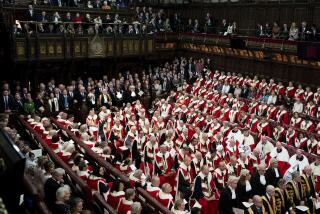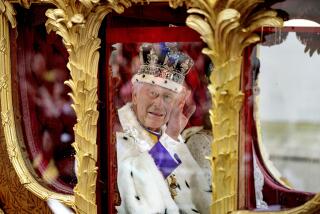Bluebloods Are Keeping Stiff Upper Lip
- Share via
LONDON — From the days of Queen Elizabeth I, power, honors and titles have flowed smoothly down the generations of the Cecil family for skillful and loyal service to crown and country.
William Cecil, the first Earl of Burghley, engineered the execution of Elizabeth’s cousin, the Catholic Mary Queen of Scots in 1587. His son, the 1st Earl of Salisbury, paved the way for James I to succeed Elizabeth.
In the 19th century, the 3rd Marquess of Salisbury served 14 years as prime minister, presiding over the expansion of a global empire.
Now, the Cecils and their fellow aristocrats are facing a fight for political life.
The Labor Party, long a critic of aristocrats’ role in government, are widely expected to oust the governing Conservatives in national elections that must be held by May and probably will come sooner.
Labor leaders are pledging to restrict voting in the unelected House of Lords to “life peers”--people who are given titles that carry membership in Parliament’s upper house but cannot be passed along to children.
Most bluebloods are not happy at the prospect of being banned from a chamber with roots that go back a thousand years, although they would keep their titles and estates.
“Hereditary peers who are active in the House of Lords are not obviously less virtuous than members of the House of Commons . . . neither are they obviously less able,” says Lord Cranborne, heir to the 80-year-old 6th Marquess of Salisbury.
Cranborne, 50, a former banker and government minister who heads the solid Tory majority in the upper chamber, is leading the campaign against change.
The Labor Party has tried to push through this reform before and failed. Like honors, titles, upper-class accents and the monarchy, the Lords appear to many Britons as just a part of life and their political role seldom registers among voters’ concerns.
That could be because the House of Lords has far less power than the elected Commons. The Lords are restricted to delaying legislation, except finance bills, for six months.
Cranborne plans to go a little further by offering to formalize a convention devised by his grandfather in 1945 that the Lords never oppose legislation stemming from the governing party’s election platform--therefore directly approved by voters.
That is unlikely to impress Labor’s leaders. And the party has an easy-to-argue case: There’s just nothing like the ermine-robed Lords left anywhere else in the democratic world.
Conservative Prime Minister John Major, a commoner of humble beginnings, has the more difficult job of defending the right to inherit power. But Major’s party has an obvious interest in the status quo.
Conservatives dominate the 1,200-member House of Lords. There are 756 hereditary peers, and among those who declare a political affiliation there are 317 Conservatives and just 14 Laborites.
The rest are life peers. Among them are the top judges and archbishops of the Church of England and a few actors and sportsmen, but most are retired politicians from the Houses of Commons nominated by party leaders.
To the Labor Party, inheriting a legislative seat is anathema.
“How can the Duke of Buccleuch and Queensberry, the largest private landowner in Britain, who owes his title to the fact that one of his ancestors was the bastard son of Charles II, represent the common man?” Labor spokesman Jack Straw said.
Retorted the duke in a BBC interview: “As for the common man, I could tell Jack Straw a thing or two about life with a capital L.”
The duke, 73, served in the Royal Navy in World War II and was a member of the Commons before inheriting his 17th century title--deriving from Charles II’s son by mistress Lucy Walters--and vast estates in Scotland and England.
Labor’s complaint about the hereditary principle doesn’t stretch to the biggest hereditary title of all, the monarch. No mainstream political party dares touch an institution that, however troubled, most Britons still want.
More to Read
Sign up for Essential California
The most important California stories and recommendations in your inbox every morning.
You may occasionally receive promotional content from the Los Angeles Times.













